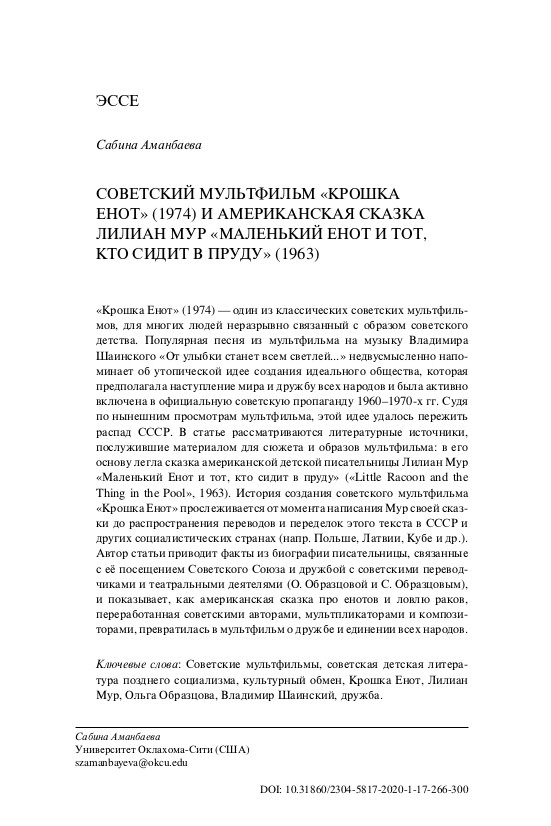Soviet Cartoon Kroshka Enot (1974) and Lilian Moore’s American Children’s Story Little Raccoon and the Thing in the Pool (1963)
DOI:
https://doi.org/10.31860/2304-5817-2020-1-17-266-300Abstract
Kroshka Enot (1974) is one of the classic Soviet cartoons that for many people is inextricably connected to Soviet childhood. The song from Kroshka Enot, “Ot ulibki stanet vsem svetlei i slonu i malenkoi ulitke” [A smile will make everyone feel brighter, from the big elephant to the little snail], with music by Vladimir Shainskii, is a utopian version of the Soviet Union that for many people, endured its collapse. At the same time, few know that the cartoon is based on an original American children’s story by Lilian Moore, entitled Little Raccoon and the thing in the pool (1963), or that there was a Ukrainian version, Medvezhonok i tot, kto zhivet v rechke (Little Bear and The One who Lives in the River), produced 8 years before the classic Kroshka Enot. The essay investigates “Kroshka Enot” as a global story: it traces Lilian Moore’s visit to the Soviet Union, her friendship with Olga Obraczova and Sergei Obrazcov who toured the U. S. with their puppet theater (Olga Obrazcova translated Moore’s story into Russian), and the different versions of the Kroshka Enot story in the Soviet Union — the 1966 cartoon version Medvezhonok i tot, kto zhivet v rechke by Kievnauchfilm; the Polish textual translation Mały szop: bajka filmowa (Little Raccoon: Film-Tale), published in 1979; Chiquitín Castor: Film-Cuento (Little Beaver: Film-Tale), which was distributed in Havana in 1982; and the Latvian translation of this story, which was published in Riga in 1982. What unites all these versions is the cartoon’s emphasis on global friendship, which was so useful to the Soviet ideal of international proletariat and global unity. From an American children’s story about raccoons, hunting and self-reliance, the story transformed into an allegory about “svetloe budushee” (bright future) and was actively promoted as a symbol of friendship in the other socialist countries.
Keywords: Soviet cartoons, Soviet children’s literature of late socialism, cultural exchange, Kroshka Enot, Lilian Moore, Olga Obrazcova, Vladimir Shainsky, friendship







